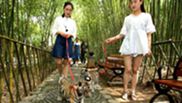物【内容提示】根据下面内容要点写一篇有关物分类的文章:①物是非常重要的生物;没有物,生命就无法维持。动物和人的食物物和其他动物。②物可以利用空气、水和阳光制造养料,而人和动物则不能。③物的种类繁多,但主要可分为两大类,即开花物(flowering plants)和不开花物(nonflowering plants)。④开花物有根、茎、叶、花和果。我们周围所有的树木大都是开花物。⑤不开花物在我们周围见不到多少,它们是些针叶树、苔藓、欧龙牙草之类。⑥多数物不是由种子而是由孢子长出来的。孢子和种子非常相似,落到潮湿背阴处就长成新的物。以下词语供参考:1.coniferous a.针叶树的 2.moss n.苔藓;地衣3.liver-wort n.欧龙牙草 4.algae n.水藻;海藻 5.fungi n.真菌 6.spore n.孢子【作文示范】PlantsPlants are very important living things. Life could not go on if there were no plants. This is because plants can make food from air, water and sunlight. Animals and man cannot do so. Animals get their food by eating plants and other animals. Man gets his food by eating plants and animals, too. Therefore, animals and man need plants in order to live.If you look carefully at the plants around you, you will find that there are many types of plants. Some plants are large while others are small. Most plants are green.There are two main types of plants: flowering plants and nonflowering plants.Flowering plants have roots, stems①, leaves, flowers and fruits. Almost all the trees around us are flowering plants. You can probably recognize some plants from their flowers or their fruits.Nonflowering plants include coniferous trees, mosses, liver-worts, algae and fungi. You cannot see many nonflowering plants around you.Most plants do not grow from seeds. They grow from spores. Spores are very, very small. Some spores are so small and light that they can float in the air. We may say that spores are quite similar to seeds. When these spores fall on wet and shady② places, they usually grow into new plants.【词语解释】①stem [stem] n. 茎;(树)干;(叶)梗②shady['sheidi] a.背阴的;阴凉的【写法指要】本文是一篇分类分析说明文。*一段写物对人和动物的重要性,我们可以把它看做引言段。第二、三、四段是分类说明:第二段说物种类繁多、大小不一,但总的可以分为两种,即开花物和不开花物;第三段具体说明开花物的情况;第四段说明不开花物的情况。第五段以物是如何繁殖的作为全文的结束段。
用英语写你喜欢的植物希望我的回答对您有所帮助
植物
【内容提示】
根据下面内容要点写一篇有关植物分类的文章:
①植物是非常重要的生物;没有植物,生命就无法维持。动物和人的食物来源于植物和其他动物。
②植物可以利用空气、水和阳光制造养料,而人和动物则不能。
③植物的种类繁多,但主要可分为两大类,即开花植物(flowering plants)和不开花植物(nonflowering plants)。
④开花植物有根、茎、叶、花和果。我们周围所有的树木大都是开花植物。
⑤不开花植物在我们周围见不到多少,它们是些针叶树、苔藓、欧龙牙草之类。
⑥多数植物不是由种子而是由孢子长出来的。孢子和种子非常相似,落到潮湿背阴处就长成新的植物。
以下词语供参考:
1.coniferous a.针叶树的 2.moss n.苔藓;地衣3.liver-wort n.欧龙牙草 4.algae n.水藻;海藻 5.fungi n.真菌 6.spore n.孢子
【作文示范】
Plants
Plants are very important living things. Life could not go on if there were no plants. This is because plants can make food from air, water and sunlight. Animals and man cannot do so. Animals get their food by eating plants and other animals. Man gets his food by eating plants and animals, too. Therefore, animals and man need plants in order to live.
If you look carefully at the plants around you, you will find that there are many types of plants. Some plants are large while others are small. Most plants are green.
There are two main types of plants: flowering plants and nonflowering plants.
Flowering plants have roots, stems①, leaves, flowers and fruits. Almost all the trees around us are flowering plants. You can probably recognize some plants from their flowers or their fruits.
Nonflowering plants include coniferous trees, mosses, liver-worts, algae and fungi. You cannot see many nonflowering plants around you.
Most plants do not grow from seeds. They grow from spores. Spores are very, very small. Some spores are so small and light that they can float in the air. We may say that spores are quite similar to seeds. When these spores fall on wet and shady② places, they usually grow into new plants.
【词语解释】
①stem [stem] n. 茎;(树)干;(叶)梗
②shady[’sheidi] a.背阴的;阴凉的
蕨类植物的英语翻译 蕨类植物用英语怎么说蕨类植物
[词典] fern; pteridophyte; Pteridophyta;
[例句]蕨类植物和针叶树的木质部仅含有管胞。
The xylem of ferns and conifers contains only tracheids.
10个关于植物的英文单词(有中文的)10个关于植物的英文单词:rose玫瑰花、tulip郁金香、grass草、 tomato番茄、 plant植物、botany植物学、tree树、seed种子、leaf叶子。
一、rose
1、含义:n. 玫瑰;蔷薇。adj. 玫瑰色的;玫瑰的。动词rise的过去式。
2、用法:
rose的意思是“玫瑰,玫瑰花; 蔷薇”,引申可指“很漂亮的人,,令人高兴的事”,是可数名词。
the Chinese rose〔the rose of China〕的意思是“月季花”。
He plucked a rose for his lover.
他为情人摘了一朵玫瑰花。
二、grass
1、含义:n. 草;草地。vt. 喂(草);(以草)覆盖;告发。
2、用法:
grass的基本意思是“草”,指各种草的总称,通常长有绿色的叶子,可以被牛、羊等动物食用的草,也可指铺设草坪用的草,还可指一片长满草的区域,即“草地,草坪,牧场”。grass还可用于指“禾本科植物”,此时多用来指不同种类的“草”。
有时,grass还可指向警察告密的人(自己往往是罪犯),即“告密者”。引申可指“大麻”“基层群众”。
The grass was wet with dew.
草被露水打湿了。
三、tomato
1、含义:n. 西红柿;番茄。
2、用法:
tomato的基本意思是“番茄,西红柿”,用作可数名词,也可用作不可数名词。
tomato可用于其他名词前作定语。
Would you like some tomato paste?
你要西红柿酱吗?
四、plant
1、含义:n. 植物;工厂;设备;设施。v. 种植;设立;建立;安插;栽赃。
2、用法:
plant的基本意思是“植物”,一般是指比树木小的植物,是可数名词。
plant作“工厂,车间”解时指生产某种固定产品的工厂,现多指重工业工厂(如电器或机械制造业的工厂),是可数名词。
All plants need water and light.
所有的植物都需要水和阳光。
五、tree
1、含义:n. 树;树状物。
2、用法:
tree的基本意思是“树”,是木本植物的统称,尤指树干高大、主干与分枝有很明显区别的木本植物,即乔木。用于比喻,可指“树形图”“谱系图”等。
We plant trees and flowers in spring.
我们在春天种花种树。






